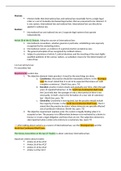Samenvatting
Summary Stappenplan Public International Law
- Instelling
- Universiteit Utrecht (UU)
- Boek
- International Law
In dit document zijn stappenplannen te vinden om je antwoord voor Public International Law te formuleren, ook met behulp van de daarbij behorende paragrafen van case law. Verder bevat het ook nog een samenvatting.
[Meer zien]





